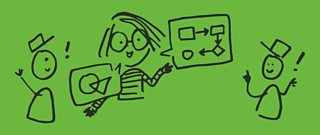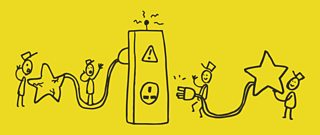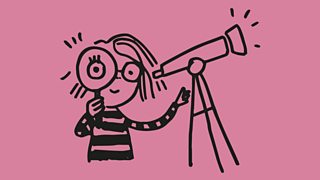
As one of our discipline teams, the UX architects use information architecture methods to bring clarity to projects. We wanted to show the variety of backgrounds and approaches in this small team, so we thought we'd introduce three members of the team – Francois, Luisa and Poorume.
How do you explain what you do for a living to a child?

Francois: I've tried this a few times. I usually use language like this: "You know how some websites, apps or games are frustrating and hard to use, while others you figure out straight away and you enjoy using? That's because they're well designed. Designers can only do that if they understand who will use the thing, and what they need it for."
Poorume: That's a great summary Francois!
I might add some context for children - "I work with people who are great at making websites and apps. Some are really good at drawing, others are fantastic at programming, some keep us organised and focused. Each skill is important to make games or apps you like. And to make the most of those skills, you sometimes need someone to understand what we're making and be able to explain it clearly to the others. So I listen, ask, and doodle with them."
To my friends who are working in the digital sector, I've tried the other version: "We understand the challenges with a holistic view from backstage to the front stage, and provide sensemaking for everyone who works on the services."
Name one favourite thing and one challenging thing about your role?

Luisa: My favourite thing is when I get to make sense of ill-defined things or when I get to organise things that haven't been organised before. It's probably the bits at the beginning of a project, before the design work even starts, when I have to make sense of the problem space and try to communicate it neatly to others. The most challenging thing is probably people not having a good understanding of what a UXA does and having to exist in that 'invisible' space.
Poorume: Interconnectivity! Everything is connected, and this is my favourite thing and the most challenging thing for me. UXAs see the invisible connection of things behind the scene. It's intriguing and thrilling when we find the new connection which benefits the ecosystem of services. But at the same time, it's challenging to meet the business needs and timelines.
Francois: My favourite part is probably looking back on a completed project, comparing the end product with the initial sketches, and seeing how much I learned and changed my assumptions since the start of the project. The design stage is the challenging part, as it can sometimes feel like a maze of endless possibilities.
What was your journey before coming to the łÉČËżěĘÖ?
Poorume: My CV looks like a honey bee dancing footprint. I've been looking for connections between businesses, technology, and design. That driven me to work at marketer, service designer, and data analyst roles. Since I studied Service Design at UAL, I've loved the holistic approach and have been passionate to connect my experiences from audience data to the front-end experiences. The łÉČËżěĘÖ UXA role allows me exactly what I want to do, there's many surprising boxes still not opened. That intrigues me every morning.
Luisa: I graduated as a graphic designer and my first job was doing infographics for print media. I love the language of infographics and at the time I thought I had found my career. I moved to London where I found a job where I could merge graphic design with infographics but after 6 years of working in that space I took a year off to travel and when I returned I realised I was tired of visual design… I shifted my focus to UX design instead. The shift from a designer/client centric approach to a user centric approach made me love design again and when I was offered a role as a UX architect I realised I was in the right place.
Francois: I also started as a graphic designer. It came from a love of drawing and video games. Designing or drawing maps of video games prepared me for UX design before I knew there was such a thing. I did a traditional design degree expecting a career in print design, typography, and illustration. Instead, the web happened. I cared more about how websites worked than how they looked, leading me to usability and information architecture. I always worked in design agencies, both large and small, before coming to the łÉČËżěĘÖ. The łÉČËżěĘÖ was always a lodestar for me, as a pioneer in communications, home computing and the web.
If you could explore any other profession, what would it be and why?

Luisa: Wood work. I like making things and I always liked playing with my grandfather's tools when we went to visit. A lot of what I do can feel intangible and I like the idea of being able to see and touch the result of a day's work.
Francois: I agree with Luisa that our work can seem immaterial, so I share the desire to make physical things, but I lack the skills and work space! I wouldn't consider another profession. But I'd like to do more volunteering (particularly in digital skills or web services for people who need it). I'm a good explainer and very patient.
What's the worst job you have ever done?
Francois: I once worked at a place where the boss insisted on lugging his 50" plasma screen to pitches, which took two of us junior designers to carry.
Luisa: Like Francois I also did my share of lugging heavy boxes around but weirdly I enjoyed it! The one that comes to mind is when I had to manually check and update the price list of several hundred products in my dad's company inventory during our 2 week summer holidays as a family.
Poorume: I've had a few bad experiences, but it wouldn't make me think that job is the worst in my life. It passes, we can make that be better next time.
Francois: That's true. I've been on many projects that have gone badly wrong (mea culpa), or difficult work situations, but I've always learned something from the experience.
If you could travel back in time and give yourself one piece of career advice, what would it be?
Francois: I'm not sure it would work, since the best advice is learned, not imparted. Probably that inspiration comes from work, not the other way round.
Poorume: Believe yourself and follow where your heart wants to go.
Luisa: Wise words! I think one message that could have been useful for me when I was starting us would be "Don't worry about job titles and focus on what YOU can bring to the table". It's a lesson I'm glad I learned even if sometimes I still worry about it. (Also, Flash player will eventually die. Hang in there!)
What do you do to switch off from work?
Poorume: Drawing with a pen and a small sketchbook that makes me get in the zone. There are usually thoughts and ideas floating in my head while working. Having time to draw something not work-related gives me space to think and organise things in my mind. Eventually, that drawing time gives me more inspiration and ideas about work.
Francois: I enjoy following creative professions that have nothing to do with the work that I do, such as animation, illustration, film and visual effects. And watching the birds in my garden.
Luisa: I'm guilty of binge watching so some of my free time is spent watching Netflix, taking care of my 70 houseplants and talking to friends. I also play dodgeball and lately I've been spending some time reading in the park.
In a world where anything is possible, what is the single most exciting thing you would do with technology?
Francois: I used to be full of ideas about this. For example, instantaneous communication with anyone, anywhere. Automatically recording everything I've seen, everywhere I've been, everything I've written – a live God's-eye-view of the world. But most of these things have come true, and turned out to have dark sides. So I'd prefer to help fix the technology we already have.
Poorume: If we can plant the human-centred design mindset for designing the database, we would be able to measure the value and emotion that our users have when using our services. It would be great if our business goals and targets would be set-up on that collected human-centred data, so we can understand better about the meaningful feedback beyond the data from the digital service behaviour.
Luisa: wow, interesting thoughts! I don't know what the most exciting thing I would do is but I think I'll be happy if I can help solve some of the complex IA problems that we find everyday in new technologies
What drives or inspires you?
Poorume: I'm a fan of detective fiction. I like the way that detectives find out the thread of clues and connect them into a piece of meaningful evidence to find out the truth.
Francois: I'm technical support for people in my family (I assume like many of us here.) Whenever I observe or speak to "non-technical" people about computer-related stuff, it's obvious how much misery and helplessness it causes them, for which they blame themselves. I see how much time they waste, and how many potential benefits they are missing. Conversely, a well-designed product can empower, delight, or simply remove a little frustration from someone's day. That's what I try to do.
Luisa: I get really happy when I'm able to fix things that are broken or when I can make things better. This year I built a bunch of new stuff for my house from stuff other people threw away, and it was quite fun and positive. I want to do more of that.








